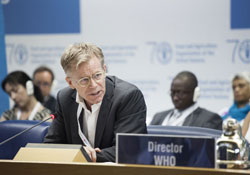Kyrgyzstan selected to receive support from new Codex Trust Fund

FAO/Giuseppe Carotenuto.
Kyrgyzstan has been selected as one of the first four countries to receive support under the new Codex Trust Fund, or CTF2. CTF2, which was launched on 27 June 2016 at the 39th Session of the Codex Alimentarius Commission, will provide an opportunity for more than 100 countries to seek up to 3 years’ support during the coming 12 years to strengthen their capacity for full and effective engagement in the Codex Alimentarius, or “Food Code”. Codex Alimentarius was established by WHO and the Food and Agriculture Organization of the United Nations (FAO) in 1963, in order to harmonize international food standards to protect consumer health and promote fair practices in food trade.
CTF2 builds on the success of the first Codex Trust Fund (FAO/WHO Project and Fund for Enhanced Participation in Codex), which ran from 2004 to 2015. It will use the experience gained over the past 12 years and take the next step in supporting developing and transition economy countries to build their capacity to fully and effectively engage in the Codex Alimentarius Commission, where international food safety standards are established. As such, it will shift from a primary focus on supporting physical participation in Codex Alimentarius meetings to helping build strong, solid and sustainable national capacity to engage in Codex, which is key to strengthening national food safety systems.
The proposal submitted by Kyrgyzstan was developed as a result of an open and engaging dialogue between national authorities, as well as FAO and WHO, to ensure intersectoral cooperation and to establish common priorities. In addition to Kyrgyzstan, 3 countries – Ghana, Madagascar and Senegal – were selected to receive the first round of support from CTF2. These countries were chosen from a number of strong applications, many of which will benefit from ongoing consultations with WHO and FAO as they prepare to resubmit in subsequent rounds.
At the opening of the 39th Session of the Codex Alimentarius Commission, Dr Bruce Aylward, Deputy Director-General of WHO, congratulated the successful countries and noted that the high quality of all applications bodes well for the success of CTF2. He stressed that in order to ensure that future applications can be supported within the 12-year life of the Fund, there is a critical need for increased and sustained donor funding.



